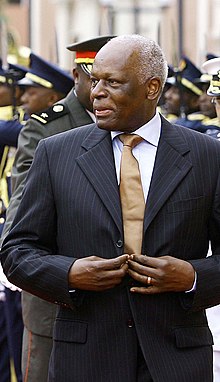Jose Eduardo dos Santos
| José Eduardo dos Santos | |
|---|---|
 |
|
| President of Angola | |
|
Assumed office 21 September 1979 Acting: 10 September 1979 – 21 September 1979 |
|
| Prime Minister |
Fernando José de França Dias Van-Dúnem Marcolino Moco Fernando José de França Dias Van-Dúnem Fernando da Piedade Dias dos Santos Paulo Kassoma |
| Vice President |
Fernando da Piedade Dias dos Santos Manuel Vicente |
| Preceded by | Agostinho Neto |
| Personal details | |
| Born |
28 August 1942 Luanda, Angola |
| Political party | Popular Movement for the Liberation of Angola |
| Spouse(s) | Ana Paula Lemos |
| Children |
Isabel José |
| Alma mater | Azerbaijan State Oil Academy |
| Religion | Roman Catholicism (Lapsed) |
José Eduardo dos Santos (born 28 August 1942) is an Angolan politician who has been President of Angola since 1979. As President, José Eduardo dos Santos is also the commander in chief of the Angolan Armed Forces (FAA) and president of the People's Movement for the Liberation of Angola (MPLA), the party that has ruled Angola since it gained independence in 1975. He is the second-longest-serving leader in Africa, surpassed only by President Teodoro Obiang Nguema Mbasogo of Equatorial Guinea, who took power less than two months before dos Santos.
Eduardo dos Santos, born in what is today the district of Sambizanga in Luanda, is the son of Avelino Eduardo dos Santos, a stonemason, and Jacinta José Paulino, immigrants from São Tomé and Príncipe in the Gulf of Guinea. He attended primary school in Luanda, and received his secondary education at the colonial elite school Liceu Salvador Correia, today called Mutu ya Kevela.
While studying in school, dos Santos joined the MPLA, which marked the beginning of his political career. Due to the repression by the colonial government, dos Santos went into exile in neighbouring Congo-Brazzaville in 1961. From there he collaborated with the MPLA and soon became an official member of the party. To continue with his education he moved, once again, to the Soviet Union, where by 1969, he received degrees in petroleum engineering and in radar communications from the Azerbaijan Oil and Chemistry Institute in Baku, Azerbaijan.
In 1970 he returned to Angola, which was still a Portuguese territory known as the Overseas Province of Angola, and played a significant role in the Angolan struggle for independence. He served for three years in the MPLA's guerrilla forces EPLA (Exército Para a Libertação de Angola) later to be known as the People's Armed Forces for the Liberation of Angola (FAPLA), a branch of the MPLA, becoming a radio transmitter in the second political-military region of the MPLA in Cabinda Province. In 1974, he was promoted to sub-commander of the telecoms service of the second region. He served as the MPLA's representative to Yugoslavia, Zaire, and the People's Republic of China before being elected to the Central Committee and Politburo of the MPLA in Moxico in September 1974.
...
Wikipedia
